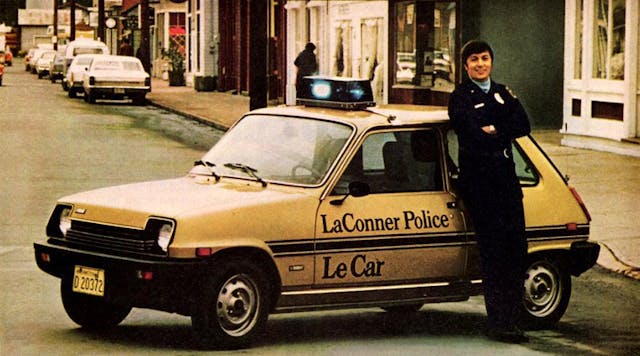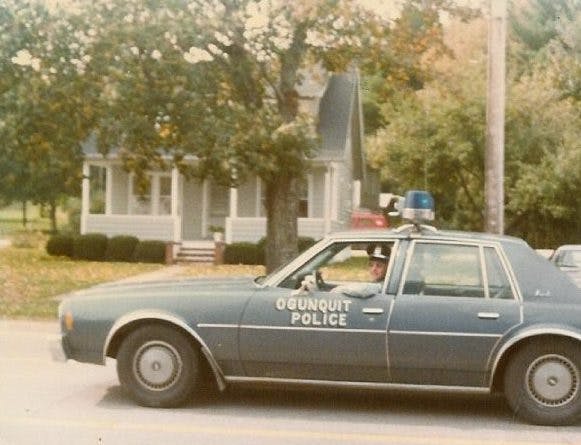In the 1970s, police departments relied on the Renault Le Car

The Malaise Era’s impact on performance, in the years between 1973 and 1984, is well-known to car enthusiasts. As automakers struggled to meet new emissions targets, with the weight of the mid-’70s oil crisis adding additional strain, the age of big American cars with generous displacement came up against demands for efficiency and budget-consciousness. Ordinary consumers naturally felt this shift, but municipal fleets were equally subject to the nationwide sea change.
To curb rampant inflation, the Federal Reserve raised interest rates dozens of times between 1972 and 1980. Rates eventually hit their peak in January 1980, with a fed fund rate of 20 percent. The economic impact was a disaster. Americans essentially quit spending money, and that filtered all the way down to local police departments which suffered unprecedented revenue strain. Adjusted for 2017 dollars, Americans spent less on local police departments in 1977 than at any point in modern history.
For small municipal departments, Malaise Era automobiles were a salient, physical manifestation of this sad predicament. Relatively expensive, gas-swilling cars like the Plymouth Fury gave way to 9C1 versions of the downsized Chevrolet Malibu and even the Nova. Some departments were forced to take more drastic measures, sourcing fleet vehicles form outside the traditional manufacturers in search of economy cars that were both cheap to purchase and to operate.

LaConner, Washington, 65 miles north of Seattle, got in early with a Renault Le Car—the slightly Americanized version of the Renault 5 introduced here in 1976. “Le Car was selected because it best fits the needs of the LaConner police force,” read a Renault ad touting the town’s purchase. “They needed an economical car that would help cut down on their expenses.”
“More and more departments are being faced with this budget crunch,” said LaConner police chief Russ Anderson in the ad. “Gas is killing us. With Le Car, we were able to decrease our budget and increase our mobility.”
That message resonated all the way across the United States, to the tiny town of Ogunquit, Maine. Like LaConner, Ogunquit is a small seaside resort, albeit on the opposite coast. With roughly 895 full-time, year-round residents, it’s roughly the same size as LaConner.

Ogunquit’s municipal status in relation to its surrounding community exacerbated the budget crunch that departments were facing nationwide. Since 1641, Ogunquit had been a village of the town of Wells, just a mile or so north on Maine’s Route 1. In the late 1970s, however, the residents of that village wanted to separate, and in 1980, Ogunquit finally emancipated itself from the larger town. Doing so meant that its various departments were on their own.
Police Chief William Hancock—a former Maine State Police trooper—therefore had to economize however and wherever possible. Turning to the Le Car for police cruiser duty was one of many such concessions.
“In 1981, I had my first start in law enforcement,” Thomas Hart said via phone.
Today, Hart is the Police Commissioner in busy Portsmouth, New Hampshire. In 1981, however, Hart was a summer auxiliary police officer, writing parking tickets and keeping the peace as the town’s population swelled with seasonal visitors. Part-time officers like Hart were assigned to drive the Le Car. Full-time, permanent officers drove Ogunquit’s marginally more conventional—and only other—police car: a white Volvo 240. For the fresh-faced Hart, the Renault was a bit of a let-down: “I remember the first time I saw [the Le Car]. I thought, ‘Well, that’s different.’”

“The Le Car was a challenge for officers that were taller than 5-foot-11,” Hart says. “You felt like you were driving it from the back seat.” Renault’s Le Car only came in two-door hatchback form until 1980, but a five-door came when the U.S. version got a facelift that included rectangular headlights. Hart also remembers that the Le Car had a manual transmission, another oddity at the time for a vehicle intended for police use.
“For the most part, we used it for parking patrol and that kind of thing,” he said, noting that its 55 hp wouldn’t have been much good for high-speed pursuit. He does remember one incident where it could’ve come to that, though:
“I was parked with the Le Car outside of Ogunquit Square and we got a call from the Wells Police Department,” he told us. “They let us know that several passengers had gotten off a Greyhound bus that used to stop in Wells before making its way south through Ogunquit to Portsmouth. They called the police to tell them that the driver was intoxicated.”
The full-time officer on duty, with the Volvo, was way across town and couldn’t get back to the Square in time to pull the bus over. So that duty fell upon Officer Hart and the tiny French hatchback with the bubblegum light on its roof.
“I pulled him over as he was weaving through the Square,” he laughed. “When I got him stopped, all the passengers bailed out. The driver was definitely intoxicated and we arrested him, although we still had to wait for the Volvo because it was the only car with four doors and a back seat.”
By the mid-1980s, Ogunquit thankfully abandoned the Le Car as a police unit, moving on to a small fleet of 9C1-prepped B-Body cruisers. But for a handful of people like Police Commissioner Hart, the Le Car remains an indelible memory.


